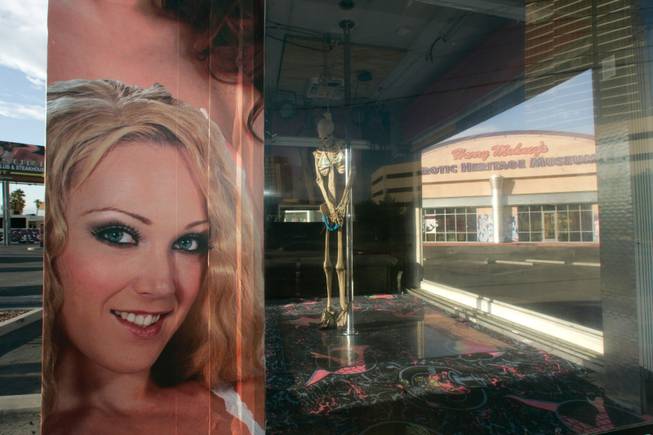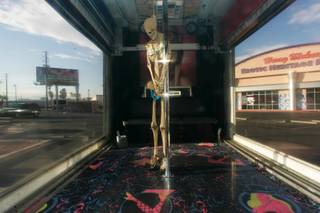
The “stripper-mobile”, now relegated to a parking lot curiosity, sits near Deja Vu and the Erotic Heritage Museum Wednesday, Nov. 18, 2009.
Thursday, Nov. 19, 2009 | 2 a.m.
Stripper-Mobile in Limbo
The stripper-mobile is off the streets for now, and the Clark County Commission has proposed to amend a law that would keep it off the streets for good. In this video, see footage of the truck in its prime and hear Deja Vu Showgirls marketing director Larry Beard defend his innovative advertising technique. Another business may have it driving down the street again within two weeks.
Sun Archives
The world has not seen the last of the Las Vegas stripper-mobile, the truck’s owner says.
Fred Robertson, owner of Always Rolling Ads, only quit hauling exotic dancers up and down the Strip last week because the nude clubs that had leased the advertising vehicle decided they didn’t want to take on county commissioners. The commissioners had cited not just complaints from offended onlookers but concerns about safety — the dancers were “unsecured” in the back of the truck, and rubbernecking motorists might drive their cars into pedestrians or other vehicles.
Attorney Jay Brown, representing the clubs, one located in Las Vegas and the other in Clark County, said they decided to have the truck parked for the remainder of its lease because they wanted to be “good citizens.”
But Robertson has his own priorities. “It’s about the right to advertise, to try to help your business,” he said.
Despite its short run on the Strip, his advertising vehicle reportedly doubled the business at Déjà Vu and Little Darlings. With bikini-clad, high-heeled women dancing, wriggling and spinning around a stripper pole affixed to the truck’s Plexiglas-enclosed truck bed, the stripper-mobile also drew international media attention and made it into a Jay Leno monologue.
At least one other business took notice and is in final negotiations to begin using Robertson’s truck. He expects it will roll again in about two weeks.
A source close to the matter told the Sun that the potential client is another strip club. Robertson would neither confirm nor deny that.
“Will content make a difference? I don’t know,” Robertson said.
Steve Sisolak, the commissioner who began looking into the issue after receiving an e-mail from a “disgusted” constituent, said “content makes no difference.”
“It’s about live entertainment,” he said.
In fact, he directed county staff to prepare an amendment to the county code to add the words “live entertainment” to restrictions that “no vehicle shall display or exhibit any signage that contains moving or flashing lights or animation of any kind.”
The rationale for the existing code is safety, Commissioner Chris Giunchigliani said.
But the word “entertainment” is a big problem, said legal onlookers familiar with First Amendment matters.
Las Vegas attorney Dominic Gentile sat through much of Tuesday’s County Commission meeting. Gentile has been the pointman on high-profile First Amendment cases defending the operating rights of those who own adult-oriented newsracks.
On Wednesday, Gentile said the county can “definitely create a law related to public safety that could affect the ability of people ... in a vehicle without seat belts or some sort of safety restraints.”
Creating a stripper-mobile with safety straps of some kind would be difficult, he acknowledged. But if that were possible, Gentile then doubted the county’s ability to restrict anything related to entertainment.
“Because entertainment by its nature is expressive, and protected,” he said. “As soon as they touch that word, it’ll go somewhere. It’ll be a law until someone goes to court to enjoin its enforcement.”
Mary Ann Miller, the county counsel, said some advertising is more distracting than others. “But I don’t think there’s a blanket defense for entertainment,” she said. “Just because it’s entertainment doesn’t mean you can’t regulate it.”
She added that a change in the code will have to be “crafted carefully.”
Allen Lichtenstein, another well-known civil rights attorney who has defended the rights of handbillers on the Strip, said he believes “this is really about content.”
“And in dealing with issues of content that some people don’t like, the county’s been down that road with handbillers,” Lichtenstein said. “If you take all the mobile billboards off the road, they’ll go back to handbilling. So be careful what you wish for.”



Join the Discussion:
Check this out for a full explanation of our conversion to the LiveFyre commenting system and instructions on how to sign up for an account.
Full comments policy